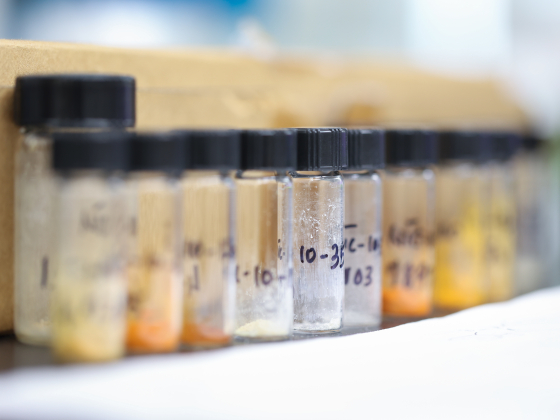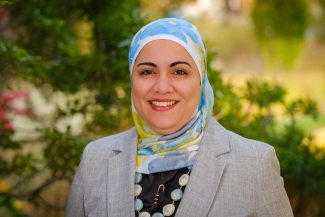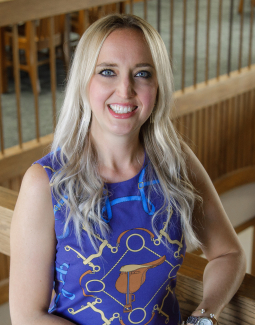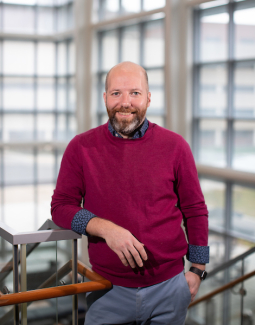
CTCB Projects
Current Projects
Quorum-sensing modulators for controlling Salmonella infections
Yosra A. Helmy, DVM, MVSc, Ph.D.
Associate Professor of One Health & Infectious Diseases, Department of Veterinary Science
August 2025 - present
Salmonella remains the leading cause of bacterial foodborne illness worldwide, and poultry is the primary reservoir of human infections. The widespread use of antibiotics to control Salmonella has fueled the rise of antibiotic-resistant strains, while vaccines have shown limited success. Left untreated, Salmonella infections are not only a major cause of acute foodborne disease but are also associated with chronic health risks, including colon and gallbladder cancers. These challenges highlight an urgent need for innovative, antibiotic-free strategies. Our project pioneers a novel approach by targeting quorum sensing (QS)—the bacterial communication system that drives Salmonella’s virulence, biofilm formation, motility, and survival. We will evaluate these QSIs in vitro, test their ability to prevent Salmonella colonization in the host, and identify their molecular targets. This work will establish a new class of therapeutics designed to disarm Salmonella rather than kill it, reducing selective pressure for resistance. By advancing antibiotic-free interventions, this project has the potential to transform food safety, curb antimicrobial resistance, and safeguard human health from both acute infections and their long-term consequences.
Mentors: Jon Thorson, Ilhem Messaoudi Powers

Dysregulation of bile acid homeostasis in obesity pathogenesis
Lindsay Czuba, Ph.D.
Assistant Professor, Department of Pharmaceutical Sciences
February 2024 - present
In obesity and its comorbidities, bile acid homeostasis is dysregulated and the membrane expression of the apical sodium-dependent bile acid transporter (ASBT, SLC10A2) is increased. ASBT inhibitors improve lipid and glucose homeostasis in patients, but their use leads to adverse gastrointestinal effects associated with bile acid malabsorption. Therefore, modulators of ASBT function and protein stability may represent an unexplored and novel pharmacological approach to restore bile acid homeostasis while circumventing adverse effects. While it is known that ASBT is degraded by the ubiquitin-proteosome system, the mechanisms by which the Ub-status of ASBT determines transport functionality, protein expression and intracellular fate remain unknown. Critically, the standard tools, used for assessing transporter biology, do not resolve rapid and sequential regulatory mechanisms such as those involved in transporter modulation. This work aims to develop and implement innovative platforms with the sensitivity to rapidly assess transport kinetics and dynamics using genetic code expansion methods and novel fluorescent bile acid substrates. These tools will then be applied in conjunction to proteomic methods to elucidate ASBT ubiquitination patterns and impact of small molecules on modulating ASBT function and protein stability. The long-term goal of this work is to develop alternatives to ASBT inhibitors and reduce the public health burden associated with bile acid dysregulation in human metabolic diseases
Mentors: Barbara Nikolajczyk, Bjoern Bauer, Linda Dwoskin

Elucidating the chemical biology of the druggable targets in enteric pathogens C. jejuni and E. coli
M. Ashfaqul Alam, Ph.D.
Assistant Professor, Department of Microbiology, Immunology, & Molecular Genetics
July 2023 - present
This proposal’s objective is to elucidate the chemical biology of microbial metabolites and small molecules to specifically target intestinal pathogens, which cause intestinal infection & inflammation. The findings will facilitate the development of intervention strategies to specifically control the emergence and spread of antibiotic resistance in this significant human pathogen without altering the entire gut microbiota.
Mentors: Qing-Bae She, Steven Van Lanen

Former Projects
Developing immunotherapeutic nanoparticles for spinal cord injury
Jonghyuck Park, Ph.D.
Assistant Professor, Pharmaceutical Sciences
March 2022 - March 2024
Traumatic spinal cord injury (SCI) leads to primary injury, followed by secondary injuries including inflammation which create an inhibitory environment. Particularly, the SCI demographic shifts toward a more equal balance among males and females, indicating that improved therapeutics are needed since the difference in physiological factors between sexes play important roles in pharmacological treatments and functional recovery after SCI. In this study, Poly(lactide-co-glycolide) (PLG)-based multiple nanoparticle (NP) formulations will be designed with various physicochemical factors to identify sex-specific key functionality of NPs to reprogram inflammation, thereby facilitating functional recovery in both sexes after SCI. Dr. Park’s study will provide a potentially practical therapy for the entire SCI population.
Mentors: John Gensel, Dave Feola, Martha Grady

Immunomodulatory therapy for bone regeneration
Ramkumar Annamalai, Ph.D.
Assistant Professor, Department of Biomedical Engineering
March 2021-August 2023
Inflammation plays a vital role in conditions that affect bone formation, resorption, and fracture healing. The majority of the work on macrophage response, in the context of bone regeneration and fracture healing, has focused on activation mediated by biochemical signals. The physical parameters of the fracture microenvironment, especially matrix mechanics and their influence on macrophage immunophenotypes, are largely overlooked and potentially critical to the healing process. Dr. Annamalai’s research program aims to elucidate the cytoskeleton-driven transcriptional control of macrophage phenotype and function during bone fracture and engineer next-generation immunomodulatory biomaterials for therapeutic bone regeneration.
Mentors: Val Adams, Daniel Pack, Vincent Venditto, Chang-Guo Zhan

Chemical biology of microbial type IV secretion systems
Carrie Shaffer, Ph.D.
Assistant Professor, Department of Veterinary Science
March 2020 - January 2023
Many important bacterial pathogens use a specialized molecular machine known as the type IV secretion system (T4SS) to deliver diverse virulence factors into target host cells. Dr. Shaffer's proposal seeks to develop robust molecular tools to accelerate the fundamental study of T4SS function, and will determine how a gastric cancer-associated T4SS assembles to transport carcinogenic microbial cargo into human cells. Success of the proposed research will advance the Shaffer lab's understanding of mechanisms underlying T4SS activity, and will stimulate the development of selective therapeutics that target the T4SS nanomachine.
Mentors: David Burgess, Konstatin Korotkov, Brian Stevenson, Sylvie Garneau-Tsodikova, David Watt

Quantitative mechanical phenotyping of bacterial biofilms on implant surfaces
Martha Grady, Ph.D.
Associate Professor, Department of Mechanical Engineering
March 2020 - January 2022
Millions of Americans have undergone procedures that require either temporary or permanent placement of a medical device or implant. Bacterial biofilms play a significant role in hospital-acquired infections at these medical device interfaces. Dr. Grady's research program aims to first understand therapeutic-resistant biofilm infections and second, to decrease propensity for their genesis by developing protocols for mechanical phenotyping of biofilms associated with device-related infections
Mentors: Dave Feola, Chris Richards, Steven Van Lanen, Jon Thorson

Gold-based pharmacophore synthetic strategies as a basis for transcription factor modulator discovery
Samuel Awuah, Ph.D.
Assistant Professor, Department of Chemistry
March 2020 - August 2021
Synthetic molecules for site-selective chemical modification of proteins expands their functional and therapeutic utility. Current technologies for protein modification can achieve site-selective conjugation but require extensive sequence engineering or limited in scope. Dr. Awuah's proposal aims to resolve this problem by developing a gold-based pharmacophore platform for site-selective protein modification that target a broad range of nucleophilic amino acid side chains toward selective disruption of protein-protein interactions.
Mentors: Edith Glazer, Jill Kolesar, Mark Leggas, Jurgen Rohr

Understanding the role of anti-apolipoprotein A-I antibodies in atherosclerotic cardiovascular disease
Vincent Venditto, Ph.D.
Assistant Professor, Department of Pharmaceutical Sciences
March 2020 - December 2020
Dr. Venditto’s research program seeks to investigate the antibody response targeting apolipoprotein A-I by implementing novel strategies to modulate epitope-specific immune responses in mice and characterize the molecular components of this response to gain mechanistic insight into their role in disease progression. These objectives will improve our understanding of the immune response associated with atherosclerosis and promote the identification of novel therapeutic targets. These data will guide future efforts to develop novel peptide and protein therapeutics to reduce the cardiovascular disease burden in patients.
Mentors: Val Adams, Greg Graf, Chang-Guo Zhan, Nancy Webb

